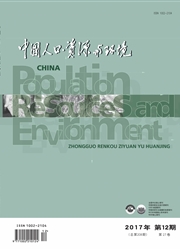

 中文摘要:
中文摘要:
过度消耗生态资本的传统经济模式。在成就中国经济增长奇迹的同时,也造成了生态资本存量的短缺,生态资本投资因而成为经济绿色转型研究的热点问题。生态资本效率提升是生态资本投资的重要目标,通过引入SBM模型处理非合意产出,测算了2003—2010年我国各省份的生态资本效率。结果显示.生态资本效率的省际差异较为明显;从各年的生态资本效率平均值来看,三大区域生态资本效率自东向西梯度递减。为考察生态资本投资对生态资本效率的影响,使用Tobit回归对各省份环境污染治理投资、当年造林面积、自然保护区面积等变量进行了检验。结果表明。东部地区的生态资本投资对于生态资本效率提升具有促进作用.而中西部地区生态资本投资的作用并不显著。应当认识到生态资本投资方式对于促进经济绿色转型的层次差异性,进而实施差异化的区域生态资本投资战略。
 英文摘要:
英文摘要:
The traditional economy mode depending on the excessive consumption of ecological capital, has acquired the achievements of Chinese economic growth miracle, and it caused the shortage of ecological capital at the same time. Ecological capital investment has become the hot issue in the study of economic green transformation. To improve the ecological capital efficiency is an important target of ecological capital investment. Through processing the non-consensual output by SBM model, the paper calculated each province' s ecological capital efficiency from year 2003 to year 2010 in China. The results showed the difference of each province' s ecological capital efficiency is obvious. Seen from the average efficiency, the three regions' ecological capital efficiency was diminishing from east China to west China. In order to study the influence of ecological capital investment to ecological capital efficiency, some variables such as the investment in treatment of environmental pollution, the area of forestation and the natural protection area were tested by Tobit regression method. The results showed that, the effect of ecological capital investment to promote ecological capital efficiency was significant in the eastern region; however it was not significant in the central and western areas. We should recognize the effect difference of the ecological capital investment to promoting economic green transformation, and then adopt the discrepant strategy in regional ecological capital investment.
 同期刊论文项目
同期刊论文项目
 同项目期刊论文
同项目期刊论文
 期刊信息
期刊信息
